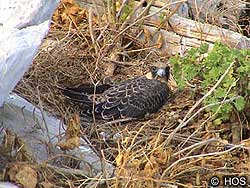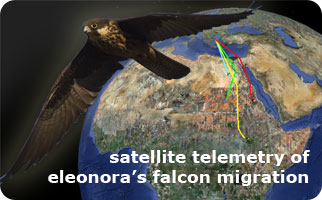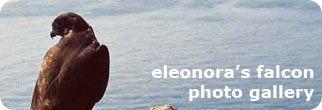|
|
 |
|
Dear farmer, protect your crop by protecting the environment
The Eleonora's falcon, a falcon also known as Varvaki in Greece, is one of these species (Falco eleonorae). There are serious indications that the significant reduction of this globally threatened species could be attributed to the illegal use of bait. USE PESTICIDES IN A RESPONSIBLE WAYThose who use pesticides should be aware of the fact that when pesticides are not applied correctly, they become dangerous to both humans and the environment, especially when they are used for the construction of bait. This non-approved use has major consequences on the environment and public health. For this reason, it is prohibited and punishable by Directive 721/77 and P.D. 115/97 of the Ministry of Rural Development and Food. A FARMER'S ALLY IS IN DANGER OF BECOMING EXTINCTThe Eleonora's falcon is the most valuable bird species that lives in Greece. About 4.500 couples, 3/4 of the species' global population, live in this country. It is the only species that does not breed in spring, but between July until, and including, October, on little uninhabited islets and remote coasts. However, to find its food, the Eleonora's falcon traverses great distances away from its home and visits agricultural lands. There it feeds on insects that damage cultivations, such as beetles, grasshoppers, night butterflies, as well as small birds that cross Greece during the autumn migration season. Because its global population is small, the Eleonora's falcon is protected by National and European legislation. Nonetheless, its population has decreased dramatically over these last years, while a large number of poisoned birds have been found. CORRECT AND RESPONSIBLE USE OF PESTICIDESSAY NO TO ILLEGAL USEThe non-approved use of pesticides in baits is illegal and dangerous. Join in helping to deal with the problem:
Help us to learn more about the dangers threatening the Eleonora's' s falcon
For more information: Please contact the Management of the Plant Protection Department of Ministry of Rural Development and Food (210 9212092), the Greek Association for the Protection of Plants (210 5229786) or the Regional Centres for the Protection of Plant and Quality Control. The Hellenic Ornithological Society (HOS), official partner of Birdlife International (the global federation of organisations for the protection of birds), was founded in 1982 and is today one of the country's most significant environmental organisations; it is the only one that focuses exclusively on the study and protection of wild birds and their habitats. Systematically recording the condition of the birds in Greece, HOS has studied hundreds of significant sites, many of which are protected today, in accordance with Greek and European legislation The HOS is working steadily for the protection of sites from illegal and arbitrary acts of governmental organisations or private individuals, often preventing the degradation or destruction of valuable biotopes. With the involvement of members and volunteers it realises activities directed at protecting birds throughout the country. The Hellenic Ornithological Society (HOS), after having been active for the past 12 years in the Aegean region, has acquired significant experience it now utilises in the materialisation of the programme LIFE - NATURE "Activities for the protection of the Eleonora's falcon in Greece". It is a four-year programme (2003-2007) and is carried out in co-operation with the Natural History Museum of Crete, the Greek Ministry of Rural Development and Food and the Royal Society for the Protection of Birds (RSPB). It is co-financed by the Leventis Foundation. It covers the totality of Greece, but also undertakes significant activities in other Mediterranean countries where the species breeds.
|
|
|
 Pesticides have been used for decades in the protection of cultivations. Unfortunately, however, they are frequently used irresponsibly for the production of illegal bait that indiscriminately kills rare and protected species. Many of these species are in reality of advantage to the producers, since they control the populations that are 'injurious' to the cultivations.
Pesticides have been used for decades in the protection of cultivations. Unfortunately, however, they are frequently used irresponsibly for the production of illegal bait that indiscriminately kills rare and protected species. Many of these species are in reality of advantage to the producers, since they control the populations that are 'injurious' to the cultivations.






